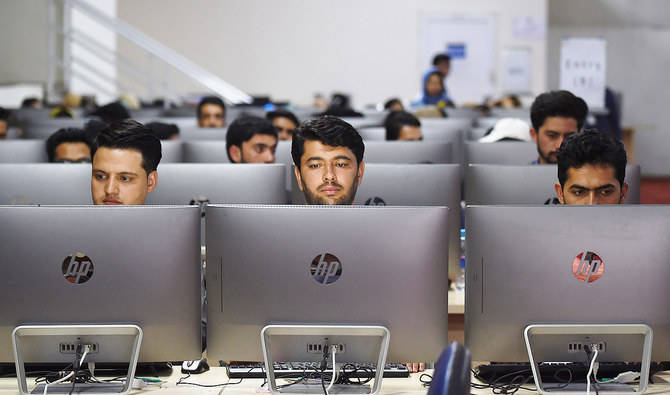KABUL: US Assistant Secretary of State Alice Wells, during talks with Afghan President Ashraf Ghani and Chief Executive Dr. Abdullah Abdullah, stressed the need for a transparent vote amid accusations by nominees that the two incumbent leaders were involved in presidential election fraud.
The vote saw the lowest turnout in any ballot since the ousting of the Taliban whose threats — apart from fatigue among voters, mismanagement, irregularities and violations — deprived hundreds of thousands of people from taking part in the polls on Sept. 28.
The IEC said that it will not be able to release the initial results on Oct. 19 because it had faced technical shortcomings, even as a number of presidential nominees said on Tuesday that Ghani and Abdullah were involved in fraud, adding that they aimed to put pressure on the IEC to announce the results in their favor.
The IEC, the Electoral Complaints Commission (ECC) and officials close to Ghani and Abdullah have denied the charges.
Wells, the US assistant secretary of state for South and Central Asia, arrived in Afghanistan on Monday and has since held separate meetings with Ghani and Abdullah who have shared power since the 2014 election that was marred with fraud. It followed a run-off where they agreed to share power under a US-brokered deal.
“I emphasized to Pre@Ashraf Ghani and CE Abdullah … that Afghan government institutions, leaders and elections must be transparent and accountable to the Afghan people …” she tweeted on Tuesday night.
“The IEC & ECC have a challenging task to review votes & process complaints, concerns, & allegations of fraud from across the country. We will support their decision on timing of release of preliminary results. Better for IEC/ECC to deliver an accurate result than a rushed one …”
The vote had been delayed twice due to division within government leaders and mismanagement as well as the progress made in peace talks between US diplomats and the Taliban.
Officials from Ghani’s administration said that the president had won a second term in office, while Abdullah declared himself as winner, causing uncertainty about the vote and doubt about the future of the country, which has been locked in war after more than four decades of foreign intervention.
The Council of Presidential Candidates (CPC) on Tuesday said that each of these two candidates declared themselves a winner of the election while the nation was still awaiting the election commission’s verdict to announce the results.
The CPC members also said that any attempt to put pressure on the election results — before the invalidation of fake votes — could push the country into a crisis.
“The ruling team is trying to refer the issue of the non-biometric votes to the Supreme Court, and this will be a great act of oppression. This will reduce any trust that the Afghan people have in the legal and judicial institutions,” Rahmatullah Nabil, a presidential candidate, said.
“These candidates (Ghani and Abdullah) messed up with three elections, so there is no one worse than them,” Enayatullah Hafiz, another presidential nominee, said.
“We didn’t get an answer from the international community whenever we consulted them, we asked several times whether you (international community) will guarantee the transparency of the election,” Ahmad Wali Massoud, a presidential election candidate, said.
Council members said that they will also dispatch a letter to the UN Security Council about the fraud by the leaders of the national unity government.
FASTFACTS
• Sept. 28 polls saw the lowest turnout in any ballot since the ousting of the Taliban.
• Of the 9.6 million people who had registered for voting, only 2 million people cast their ballot.
• The election commission says it will not be able to release the initial results on Oct. 19.
“We are completely monitoring the work of the secretariat of the election commission, we will not allow them to commit a violation. Anyone who tries to commit a violation — his place will be in prison,” said Shahab Hakimi, a presidential election candidate.
The council also stated that it was trying to prevent the entry of 1 million fake votes into the election commission’s database.
“Alice Wells visit to Afghanistan conveys two messages: first, election bodies were under immense pressure by parties and she has a clear answer to them,” Wahidullah Ghazikhail, an analyst, told Arab News.
“Second, her remarks are hopeful for Afghans, despite the elections results being postponed. From her talks with the president and CEO, it seems that the election will go to the second round, and the current government will run until spring because of winter. Meanwhile, Taliban-US talks will resume, and sign an agreement afterward. The Taliban will talk with the winner of the election.”



























